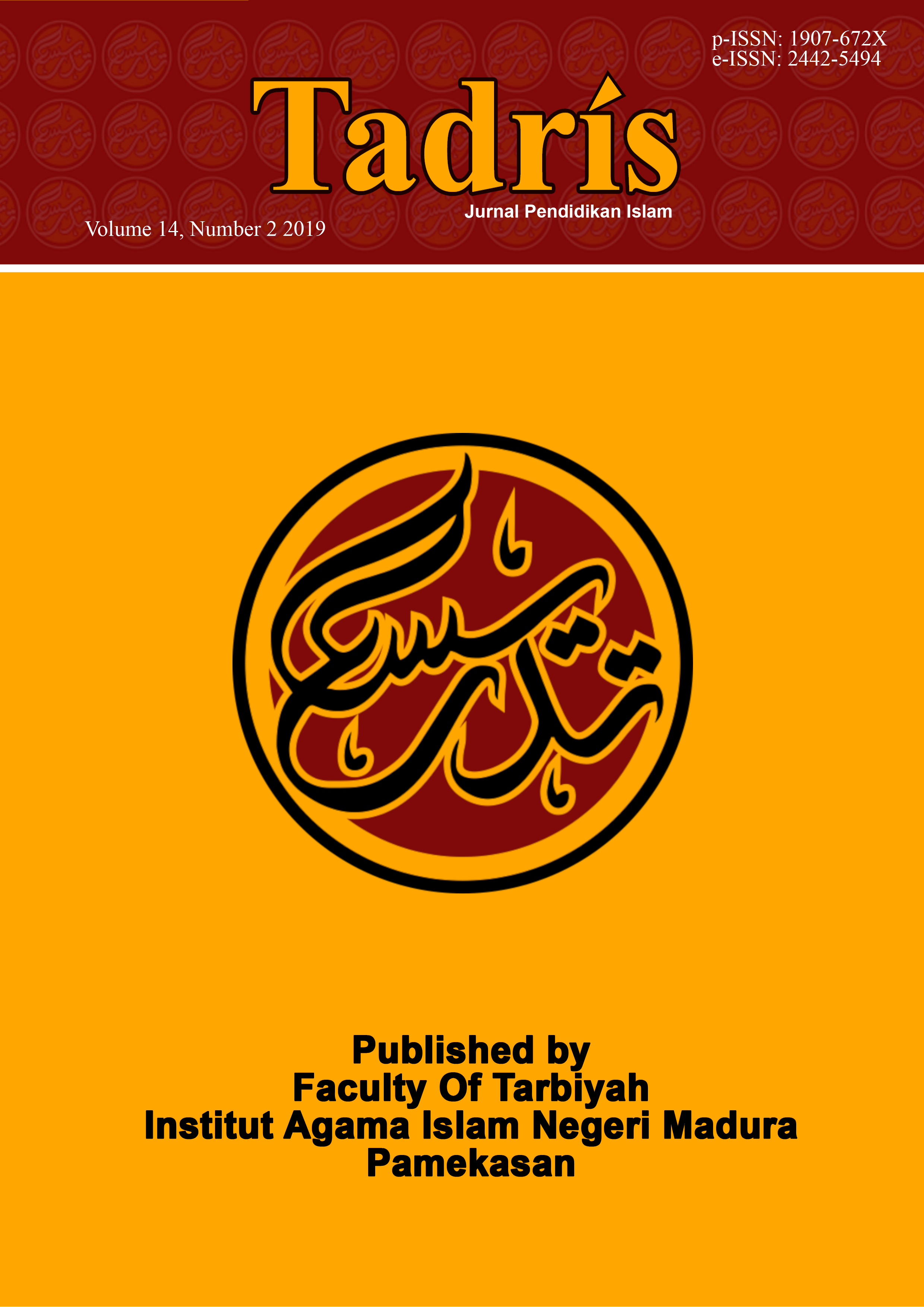Keberhasilan Program Tahfidz Al-Qur'an Kejar Paket B Darul Qur'an Al-Karim Baturaden Banyumas T.A. 2018-2019
 Abstract views: 402
,
Abstract views: 402
,
 PDF downloads: 374
PDF downloads: 374
 Untitled downloads: 0
Untitled downloads: 0
Abstract
The study entitled The Success of the Tahfidz al-Qur'an Program on the Pursuit of Package B Daqu al-Karim Banyumas Baturraden is motivated by several things including: First, Tahfidz 30 juz program of the Pursuit of Package B Daqu al-Karim is the only flagship program in Banyumas Regency. Second, the success rate of the Tahfidz program reaches 82%. Thirdly, Daqu al-Karim's Tahfidz Package B program has an applicative curriculum that is arranged in a planned, measurable manner and takes into account the environment, culture, and conditions of the child. Data collection in this study using the method of observation, interviews and documentation. The data analysis is done through the process of data reduction, data display and drawing conclusions and verification.
The results of this study indicate the success of the Tahfidz al-Qur'an program on the Pursuit of Package B Daqu al-Karim in the 2018-2019 school year was determined by the institution's vision policy and strengthening strategies implemented in the program: first, prepare the tahfidz curriculum applicatively. Second, tighten the selection of recruitment of teaching staff and prospective students. Third, strengthen the development of learning methods. Fourth, improve leadership quality. Fifth, create cooperation and agreement to approve the program. As well as the sixth, implementing program evaluation and control. The six strategies are synergized with each other and the implementation is evaluated based on the target targets that have been determined.
Keywords: Tahfidz al-Qur'an, Pursue Package B, Non Formal Education.
Downloads
References
al-Syaibany, Omar Mohammad al-Taumy. Falsafah Pendidikan Islam, terj. Hasan Langgulung. Jakarta: Bulan Bintang. 1979.
Aziz, Safrudin. Manajemen Mutu Perguruan Tinggi: Koreksi dan Implementasi. Yogyakarta: Gava Media. 2016.
Aziz, Safrudin. Strategi Pembelajaran Aktif Anak Usia Dini: Panduan bagi Guru, Orang Tua, Konselor, dan Praktisi Pendidikan Anak Usia Dini. Yogyakarta: Kalimedia. 2017.
Chaidar. “Metodologi Pembelajaran”. Makalah Seminar. Medan: Perguruan al-Azhar Medan. 2005.
Dakir, Perencanaan dan Pengembangan Kurikulum. Jakarta: Rineka Cipta. 2004.
Departemen Pendidikan Nasional. Manajemen Peningkatan Mutu Berbasis Sekolah, Konsep Dasar, Buku 1. Jakarta: Direktorat Jenderal Pendidikan Dasar dan Menengah. 2002.
Edi dkk. “Pengaruh Keterlibatan Orang Tua dan Pola Asuh terhadap Disiplin Anak”. Jurnal Pendidikan Anak Usia Dini. Vol. 12 Edisi 2, Nopember 2018.
Kamars, M. Dachnel. “Kebijakan Pendidikan dan Peningkatan Mutu Pendidikan”, dalam Membangun Paradigma Pendidikan Islam, ed. Muhmidayeli. Riau: Program Pascasarjana UIN Suska Riau. 2007.
Lubis, Halfian. Pertumbuhan SMA Islam Unggulan di Indonesia: Studi Tentang Strategi Peningkatan Kualitas Pendidikan. Jakarta: Badan Litbang dan Diklat Departemen Agama RI. 2008.
M. Saleh, Muntasir. Pengajaran Terprogram, Teknologi Pendidikan dengan Pengandalan Tutor. Jakarta: Rajawali. 1985.
Mulyadi. Kepemimpinan Kepala Madrasah dalam Mengembangkan Budaya Mutu: Studi Kasus di Madrasah Terpadu MAN 3 Malang, MAN Malang 1 dan MA Hidayatul Mubtadi’in Kota Malang. Jakarta: Bdan Litbang dan Diklat Kementerian Agama RI. 2010.
PKBM Darul Qur’an al-Karim. Dokumen PKBM Darul Qur’an al-Karim Karangtengah Baturraden Banyumas Tahun 2017. Purwokerto: PKBM Daqu al-Karim. 2017.
Prabowo, Suto. “Total Quality Management (TQM) dalam Pendidikan”. Jurnal Sosial Humaniora. Vol. 5 No.1, Juni 2012.
Ramadhan, Yoga Achmad. “Kesejahteraan Psikologis pada Remaja Santri Penghafal al-Qur’an”. Jurnal Psikologika. Vol. 17, No. 1. 2012.
Suprayogo, Imam. Quo Vadis Madrasah, Gagasan, Aksi dan Solusi Pembangunan Madrasah. Yogyakarta: Hikayat. 2007.
Sutrisno. Pendidikan Islam di Era Peradaban Modern. Jakarta: Prenada Media Group. 2015.
Syafaruddin. Manajemen Lembaga Pendidikan Islam. Jakarta: Ciputat Press. 2005.
Yamit, Zulian. Manajemen Kualitas Produk dan Jasa. Yogyakarta: CV. Adipura. 2001.
Yayasan Darul Qur’an al-Karim. Dokumen Kurikulum Kejar Paket B Daqu al-Karim Karangtengah Baturraden Banyumas Tahun 2017. Purwokerto: tp. 2017.
Copyright (c) 2019 TADRIS: Jurnal Pendidikan Islam

This work is licensed under a Creative Commons Attribution-NonCommercial 4.0 International License.
The journal operates an Open Access policy under a Creative Commons Non-Commercial 4.0 International license. Authors who publish with this journal agree to the following terms:
- Authors retain copyright and grant the journal right of first publication with the work simultaneously licensed under a
 Commons Attribution-NonCommercial 4.0 International License
Commons Attribution-NonCommercial 4.0 International Licensethat allows others to share — copy and redistribute the material in any medium or format, and adapt — remix, transform, and build upon the material.
- Authors are able to enter into separate, additional contractual arrangements for the non-exclusive distribution of the journal's published version of the work (e.g., post it to an institutional repository or publish it in a book), with an acknowledgement of its initial publication in this journal.
- Authors are permitted and encouraged to post their work online (e.g., in institutional repositories or on their website) prior to and during the submission process, as it can lead to productive exchanges, as well as earlier and greater citation of published work (see The Effect of Open Access).














